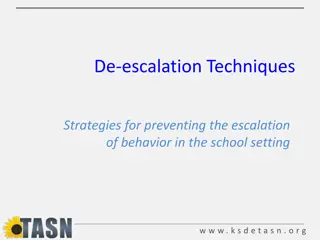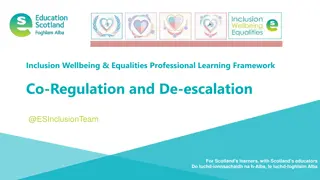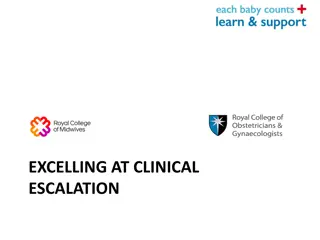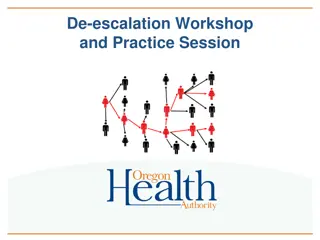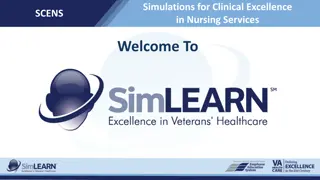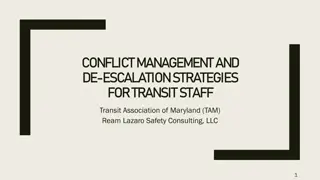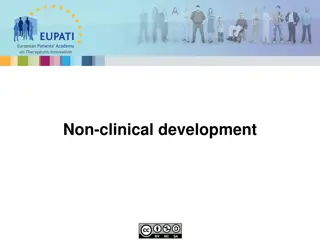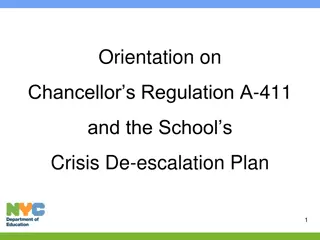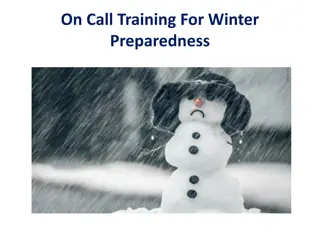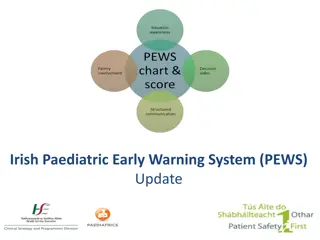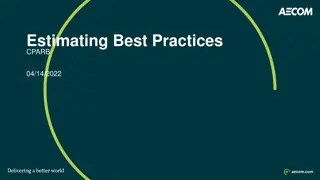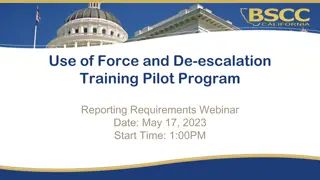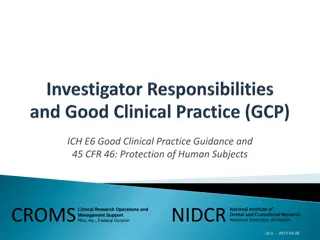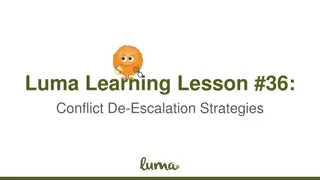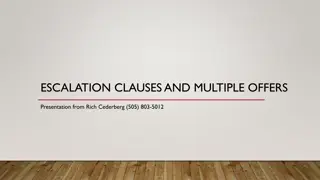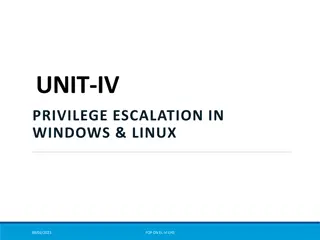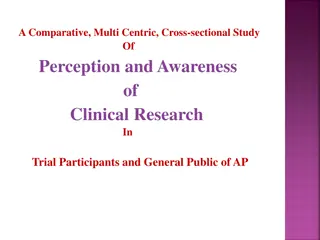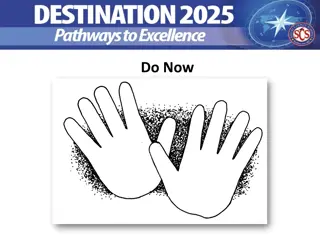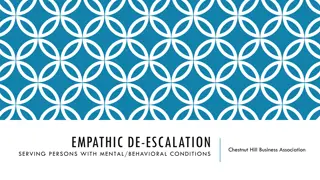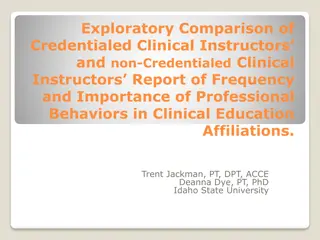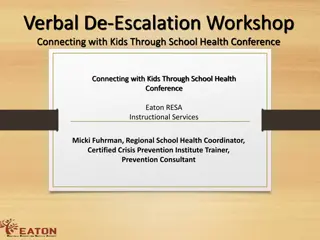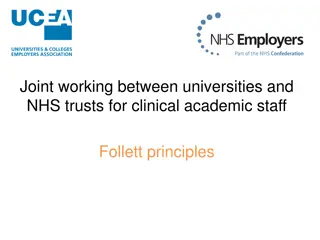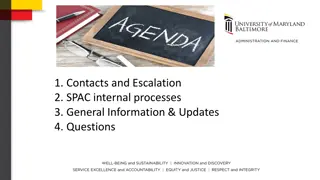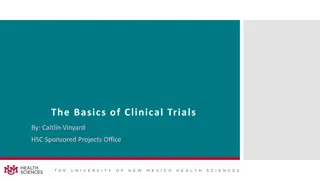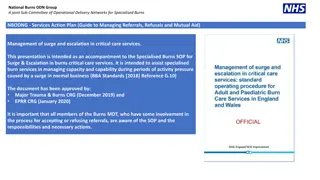India Alliance Clinical & Public Health fellowship in India
India Alliance Clinical & Public Health fellowship in India\n\nIndia Alliance Clinical and Public Health Research Fellowships are for Health researchers with an MD, MS, MPH, or an equivalent clinical or public health degree, who can apply for the DBT\/Wellcome Trust India Alliance Clinical and Publi
0 views • 5 slides
Effective De-escalation Techniques for School Settings
Explore strategies and techniques for preventing behavior escalation in schools based on the work of experts like Dr. Geoff Colvin and Dr. George Sugai. Understand the importance of managing disruptive behaviors, proactive interventions, and stages of escalating behavior. Discover how to become flue
1 views • 52 slides
Scotland's Professional Learning Framework: Co-Regulation and De-escalation
This professional learning framework focuses on co-regulation and de-escalation strategies for Scotland's educators to enhance the well-being and inclusion of Scotland's learners. It includes resources for facilitating group or self-directed learning activities, emphasizing the importance of creatin
1 views • 39 slides
Clinical Escalation: Building Effective Communication in Maternity Units
Exploring the importance of clinical escalation in maternity units, this session outlines the components and practices involved in identifying, communicating, and acting upon clinical concerns. It emphasizes recognizing deviation from normality, effective communication, and taking appropriate action
0 views • 27 slides
Ethical Issues in Clinical Pharmacy Research by Dr. Haider Raheem Mohammad
Research ethics play a crucial role in clinical trials and therapeutic research in the field of pharmacy. From discovery to validation, all medicines undergo rigorous evaluation processes to ensure safety, efficacy, and freedom from adverse effects. Clinical trials in both animals and humans are ess
0 views • 20 slides
Advanced Clinical Practice Framework and Pillars of Practice
The document discusses the advanced clinical practice framework and the four pillars of practice which include leadership & management, clinical practice, education, and research. It emphasizes the importance of core capabilities and area-specific competence in advanced clinical practice. The role o
2 views • 8 slides
De-escalation Workshop and Practice Session Overview
This overview provides insights into a De-escalation Workshop and Practice Session, emphasizing the importance of video and microphone usage, the commitment of the CRRU Training Team, workshop topics, and strategies for building rapid rapport. It also discusses common concerns and pushback faced in
0 views • 25 slides
Objective Structured Clinical Examination (OSCE): A Modern Approach to Assessing Clinical Competence
The Objective Structured Clinical Examination (OSCE) is a modern examination method widely used in the field of health science to evaluate clinical skill performance. It involves stations where medical students interact with simulated patients to demonstrate competencies such as history taking, phys
1 views • 40 slides
Clinical Excellence in Nursing: SCENS Simulations for Disruptive Behavior Management
SCENS provides simulations focusing on Prevention and Management of Disruptive Behavior (PMDB) in nursing services, emphasizing safety protocols and effective communication. The training covers early signs of escalating behavior, stress levels recognition, and interventions to handle disruptive situ
0 views • 19 slides
Conflict Management and De-escalation Strategies for Transit Staff
This presentation by the Transit Association of Maryland (TAM) and Ream Lazaro Safety Consulting provides insights into the increasing assault injuries in transit since 2008, definitions of assault, assault types, contributing factors, basic needs of transit passengers, and passenger traits that may
0 views • 57 slides
NIMH Clinical Research Education and Monitoring Program Overview
NIMH's Clinical Monitoring and Clinical Research Education, Support, and Training Program (CREST) aims to ensure the proper conduct, recording, and reporting of clinical trials. This program includes clinical monitoring plans, guidelines for site monitoring activities, and independent clinical monit
1 views • 29 slides
Understanding the Irish National Early Warning System (NEWS)
The Irish National Early Warning System (NEWS) serves as a vital tool in acute settings for identifying and responding to deteriorating patients. Introduced in 2013, NEWS assists in classifying patient conditions, provides communication tools for escalating care, and emphasizes the role of clinical
0 views • 37 slides
Understanding Non-Clinical Development in Therapeutic Innovation
The European Patients Academy on Therapeutic Innovation focuses on the non-clinical development phase of medicine, delving into efficacy assessment, safety evaluation, and manufacturing process considerations. Non-clinical studies are essential for decision-making in clinical trials, marketing appli
1 views • 26 slides
School Crisis De-escalation Strategies and Plans
Schools in New York City are committed to maintaining safe and orderly environments for effective teaching and learning. Establishing Crisis Intervention Teams and completing Crisis De-escalation Plans are essential. De-escalation strategies involve identifying crises, assessing strengths and weakne
0 views • 31 slides
Understanding Conflict Dynamics and Peace Processes
Explore the distinctions between peacekeeping, peacemaking, and peacebuilding in conflicts. Learn about conflict dynamics and the stages of escalation and de-escalation. Discover how these models guide responses and peace efforts, emphasizing the importance of long-term peacebuilding for sustained r
0 views • 8 slides
Winter Preparedness Training for Strategic Leadership in Escalation Situations
The Winter Preparedness Training focuses on preparing executive leads and on-call managers to provide strategic leadership during extreme periods of escalation. The training covers roles and responsibilities, strengths and weaknesses, escalation processes, teleconference chairing skills, partner col
0 views • 20 slides
Understanding Privilege Escalation and Backdoor Installation in Cybersecurity
Privilege escalation allows unauthorized access to system resources, while backdoors enable persistent access for attackers. The attack scenario involves compromising a website to deploy malicious files, such as Remote Access Trojans, leading to potential system compromise.
0 views • 13 slides
Understanding Evidence-Based Medicine and Clinical Decision-Making
European Patients Academy on Therapeutic Innovation emphasizes the importance of Evidence-Based Medicine (EBM) in providing optimum clinical care. EBM involves systematic review and utilization of clinical research for informed decision-making, benefiting patients in disease management and treatment
7 views • 20 slides
Irish Paediatric Early Warning System (PEWS) Update and Implementation Overview
Explore the latest updates on the Irish Paediatric Early Warning System (PEWS) including learning outcomes, aims, observation charts, key points, escalation guide, and response pathways. Understand the importance of clinical judgment, individualized assessment, and standardized communication for rec
0 views • 15 slides
Essential Aspects of the Clinical Interview in Psychology
Clinical interviews play a crucial role in the assessment conducted by clinical psychologists, showcasing essential qualities like validity, reliability, and clinical utility. Understanding the importance of feedback and honing general and specific skills as an interviewer are key components in cond
1 views • 17 slides
Project Management Fees and Escalation Challenges Analysis
In the analysis of project management fees and escalation challenges, key findings include low fee percentages, inconsistent reporting practices, and high escalation rates. Proposals suggest revising fee structures, monitoring design/management fees, and addressing code and practice escalation. Reco
2 views • 12 slides
Data Governance Issue Assessment Process Overview
The data governance issue assessment process formalizes how data issues are resolved by identifying clear steps to resolution, assigning responsibilities, and ensuring proper documentation. Lead stewards, liaisons, committee members, and support personnel play key roles in this process, which includ
1 views • 12 slides
Use of Force and De-escalation Training Pilot Program Reporting
The Use of Force and De-escalation Training Pilot Program aims to enhance law enforcement training methods. Established under the 2022 Budget Act, it requires reporting on participant demographics, training details, incidents, expenditure, and satisfaction metrics. Reports include baseline, annual d
4 views • 15 slides
Effective Ways to Handle Escalation with Your Child
Explore top 10 do's and don'ts when dealing with escalation with your child, emphasizing on maintaining composure, positive communication, and effective de-escalation techniques to handle challenging situations constructively. Learn about common escalation patterns and practical strategies to diffus
0 views • 4 slides
Clinical Research Guidelines and Regulations Overview
Clinical research encompasses various guidelines and regulations to ensure the protection of human subjects and the credibility of study results. Key aspects include Good Clinical Practice (GCP) standards, Title 45 of the Code of Federal Regulations (CFR) Part 46, and additional CFR sections for cli
0 views • 46 slides
Conflict De-Escalation: Strategies for Handling Workplace Conflicts
Learn effective conflict de-escalation strategies for handling workplace conflicts. Strategies include removal/walk away, calming yourself, checking voice and body language, being aware of surroundings, expressing empathy and understanding, and reflecting and regrouping for future resolution.
0 views • 7 slides
Effective De-escalation and Distraction Techniques for Children
De-escalation techniques focus on helping children manage overwhelming emotions. Strategies include acknowledging feelings, using distraction, and giving space. Avoid demanding, stay calm, respect personal space, and offer distractions. Knowing what your child likes and dislikes is key to effective
0 views • 6 slides
Understanding Escalation Clauses in Real Estate
An escalation clause, also known as an escalator, allows a home buyer to increase their offer if a competing offer is higher. This presentation explains the components of an escalation clause, how it works in multiple offer situations, and provides sample language for incorporating it into a real es
0 views • 8 slides
Ohio Clinical Alliance: Transforming Clinical Experiences
The Ohio Clinical Alliance, through collaborative partnerships, aims to enhance clinical preparation for educators. The leadership team comprises various representatives and organizations committed to improving student learning. Their activities include retreats and meetings to ensure effective comm
0 views • 27 slides
Understanding Privilege Escalation in Windows and Linux Systems
Privilege escalation attacks are malicious tactics used by attackers to gain unauthorized access and elevated privileges in a system. These attacks exploit vulnerabilities in operating systems and web applications, allowing attackers to move deeper into a network to access high-value assets. This co
0 views • 28 slides
Perception and Awareness of Clinical Research in Trial Participants and the Public of Andhra Pradesh
This study focuses on understanding the perception and awareness of clinical research among trial participants and the general public in Andhra Pradesh. It highlights the importance of creating awareness about clinical research, previous study results, public attitudes towards clinical trials, and e
0 views • 24 slides
De-Escalation Strategies in Classroom Management
Learn effective de-escalation strategies to manage classroom behaviors using Love and Logic principles. Explore techniques to prevent explosive behaviors, understand verbal and non-verbal de-escalation methods, and create a proactive plan to address challenging situations. Discover the importance of
0 views • 34 slides
Windows Security Overview and Best Practices
Windows operating system security overview focusing on preventing unauthorized access, privilege escalation, and password vulnerabilities. Includes countermeasures such as setting proper permissions, implementing strong passwords, and detecting vulnerabilities. Covering topics like remote password g
0 views • 6 slides
Empathic De-escalation for Handling Mental Health Issues in the Workplace
Reduce stigma around mental and behavioral health in the workplace through education. Understand behaviors as forms of communication and learn de-escalation techniques. Manage responses, establish rapport, and use non-judgmental approaches to address escalating situations effectively.
0 views • 9 slides
Comparison of Professional Behaviors in Clinical Education
Professional behavior characteristics play a crucial role in enhancing student learning during clinical education. This study examines the differences in reported importance and frequency of professional behaviors between credentialed and non-credentialed clinical instructors. The background outline
0 views • 28 slides
Verbal De-Escalation Techniques for Connecting with Kids at School Health Conference
This content highlights the importance of verbal de-escalation in connecting with kids through a school health conference, providing insights on crisis development models, handling anxiety, empathic listening, and dealing with defensive behavior. The workshop emphasizes building rapport and understa
0 views • 48 slides
Enhancing Clinical Academic Collaboration Between Universities and NHS Trusts
Clinical academics play a crucial role in integrating clinical practice, research, and education within the NHS. Collaboration between universities and NHS trusts is key to ensure clinical academics address the right questions for patient care and societal benefit. Challenges include an aging clinic
0 views • 29 slides
SPAC Internal Processes and Contact Information
This information covers SPAC internal processes related to collections, reporting, response time for issues, and escalation procedures. It also provides contact details for various SPAC teams, emphasizing email communication for faster resolutions. Additionally, it outlines the quarterly collections
0 views • 22 slides
Understanding Clinical Trials: Phases, Types, and Definitions
Clinical trials play a crucial role in advancing medical research and treatment options. This comprehensive guide covers the basics of clinical trials, including their definition, phases, types, and key definitions like IND, IDE, NDA, and more. Discover how different phases of trials work, the vario
0 views • 16 slides
National Burns ODN Group A Joint Sub-Committee Action Plan
This presentation accompanies the Specialised Burns SOP for managing surge and escalation in critical care services. It provides guidance on handling referrals, refusals, and mutual aid to manage capacity during periods of increased activity pressure. The document, approved by Major Trauma & Burns C
0 views • 22 slides

